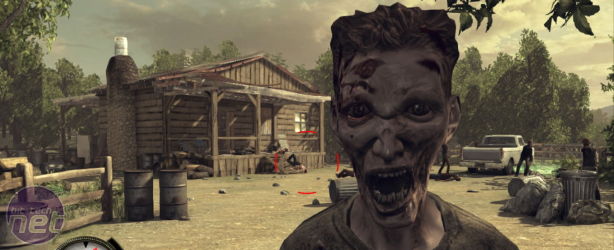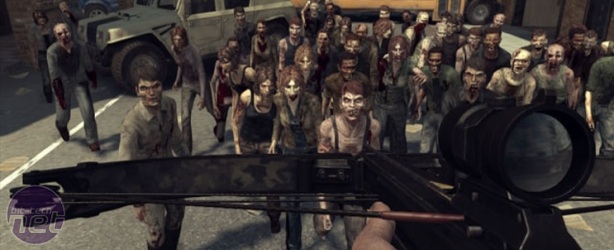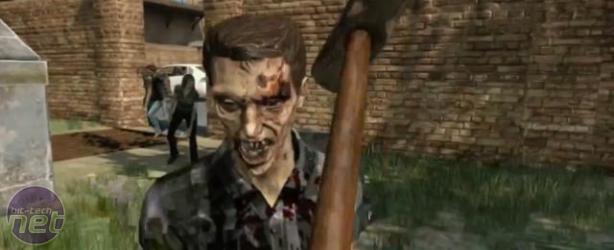
The other side of the gameplay is within interstitial stages. Survival Instinct takes on a pseudo-choose-your-own-adventure mechanic where you’ll travel by car along a map of Georgia to another area, but to get there you’ll have to decide which kind of route to take. You can pick a method that will expend a lot of fuel but make it unlikely to break down, one that will cause you to break down more often but expend less fuel, and one in the middle of both options. If you have to stop for either reason you’ll get out of the car, scavenge an area (which can often be exactly the same as you’ve just visited) for supplies and return. That’s functionally the same task and will pop you into the same location either way to perform it. Since it’s possible to collect fuel in some supply throughout the game’s regular levels anyway there’s no real reason not to pick that option every time.

Helping in this endeavour are AI partners that can be collected throughout the adventure, either in story beats or the occasional random encounter. You’re able to send them off on scavenging missions to find fuel or ammo, raising their effectiveness and likelihood of returning by arming them with weaponry you find. The word collected is used because the game ostensibly treats these characters as a commodity rather than emotionally engaging fellow survivors.
In particular, if you ever have too many characters for your vehicle to contain, you have to decide who is left behind. It’s done completely without fanfare. You ostensibly sacrifice a person because they’re a burden and yet this isn’t reflected any way in the game. This misunderstands the purpose of the franchise, or zombie fiction in general; it’s about how characters deal with each other after the world has become abnormal, it shouldn’t ever disregard that.

Your own character Daryl Dixon is at least well voiced by his TV actor Norman Reedus. The narrative starts with him split up from his brother Merle (star Michael Rooker, who phones this performance in from another continent, but at least doesn’t appear much). The pair reunite, split up again and get together once more in time for an abruptly appearing credits. That’s ostensibly the entire game’s emotional arc.
The game does also look quite good in parts with some impressively grim looking zombies that can be fairly intimidating when chasing you down in great hordes. Plus the lighting and environments all feel reasonably up to date in terms of graphical fidelity. But, those environments are sparsely furnished and don’t at all feel as if they exist in a world where people truly lived.

As for the enemy AI it's riddled with bugs, favourites including noticing you within a building, coming through to the other side of a door and then knocking against it trying to get back out, as well as rigid “jump scare” moments where they’re forced to grapple you when you pass a certain point, even if you’ve noticed them and stepped backward. The latter causes the games to force the zombies to rapidly and without any further animation rush toward you at mach speed to finish their grab.
Worst of all, the developers made a strange choice about how to show off that your character is exhausted from the exertion of running. Visual sweat will start dripping down the top and sides of the screen as if emulating his moistened brow; it’s disgusting and happens every time you run anywhere. And of course it's total nonsense - FPS games are supposed to look through the eyes of the protagonist, not their forehead.
The Walking Dead: Survival Instinct is a shame, not just for it’s own failings as a game, but as a mark on the franchise and licensed games as a whole. It is unworthy of your time and especially so at the full price that it demands.

Helping in this endeavour are AI partners that can be collected throughout the adventure, either in story beats or the occasional random encounter. You’re able to send them off on scavenging missions to find fuel or ammo, raising their effectiveness and likelihood of returning by arming them with weaponry you find. The word collected is used because the game ostensibly treats these characters as a commodity rather than emotionally engaging fellow survivors.
In particular, if you ever have too many characters for your vehicle to contain, you have to decide who is left behind. It’s done completely without fanfare. You ostensibly sacrifice a person because they’re a burden and yet this isn’t reflected any way in the game. This misunderstands the purpose of the franchise, or zombie fiction in general; it’s about how characters deal with each other after the world has become abnormal, it shouldn’t ever disregard that.

Your own character Daryl Dixon is at least well voiced by his TV actor Norman Reedus. The narrative starts with him split up from his brother Merle (star Michael Rooker, who phones this performance in from another continent, but at least doesn’t appear much). The pair reunite, split up again and get together once more in time for an abruptly appearing credits. That’s ostensibly the entire game’s emotional arc.
The game does also look quite good in parts with some impressively grim looking zombies that can be fairly intimidating when chasing you down in great hordes. Plus the lighting and environments all feel reasonably up to date in terms of graphical fidelity. But, those environments are sparsely furnished and don’t at all feel as if they exist in a world where people truly lived.

As for the enemy AI it's riddled with bugs, favourites including noticing you within a building, coming through to the other side of a door and then knocking against it trying to get back out, as well as rigid “jump scare” moments where they’re forced to grapple you when you pass a certain point, even if you’ve noticed them and stepped backward. The latter causes the games to force the zombies to rapidly and without any further animation rush toward you at mach speed to finish their grab.
Worst of all, the developers made a strange choice about how to show off that your character is exhausted from the exertion of running. Visual sweat will start dripping down the top and sides of the screen as if emulating his moistened brow; it’s disgusting and happens every time you run anywhere. And of course it's total nonsense - FPS games are supposed to look through the eyes of the protagonist, not their forehead.
The Walking Dead: Survival Instinct is a shame, not just for it’s own failings as a game, but as a mark on the franchise and licensed games as a whole. It is unworthy of your time and especially so at the full price that it demands.
-
Overall20 / 100


MSI MPG Velox 100R Chassis Review
October 14 2021 | 15:04









Want to comment? Please log in.